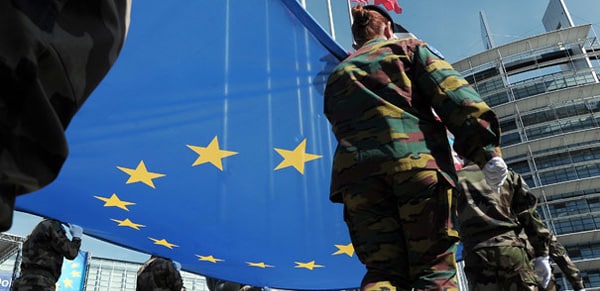
Jean-Claude Juncker can sometimes be very daring. But words count, and should be used with precision. Speaking to a German newspaper, the President of the European Commission has called for a ‘European army’ to help cope with the challenge posed by Russia, to defend European ‘values’ and for the EU to take up its ‘responsibility in the world’ and be able ‘to react to a threat to peace in a Member State or neighbour’. He even said that ‘it would have been useful during the crisis in Ukraine’. But how? He has stirred up quite a lot of comment and a spokesman from the Commission had to ‘qualify’ his statement, saying that this would be a very long term project.
For a start, European institutions are too often far too shy about talking of European ‘interests’ and merely insist on almost solely about ‘values’ (which undoubtedly must be defended, although internally there has been a degree of democratic reversal in certain Member States). Secondly, Juncker’s vision totally ignores the threats emerging from the South (and it is a South that penetrates into Europe) and solely focuses on Russia (while it is Putin’s activities in Ukraine that have resulted in a revived NATO).
Admittedly, the Lisbon Treaty (art.42.7 of the European Union Treaty) contains a mutual defence clause whereby, as in NATO’s art.5, if a Member State is the victim of armed aggression on its territory, the others have the obligation to aid and assist it by all means in their power. This does not necessarily imply military intervention, and today neither the EU nor its members are in any state to enforce such a provision. Perhaps NATO could, to a slightly greater extent. European military budgets have been severely reduced both by the post Cold War climate and the economic crisis, as have their capabilities (by up to 20% in five years). NATO has again pushed for its members to up their defence spending to 2% of GDP, but this still looks quite difficult to achieve even despite the now far more threatening security environment to the East and South; not to mention the lack of common political will to actually use these forces. In fact, although the EU has some battle groups, they have never been put to use.
Before having a ‘European army’ that would be the culmination of a federal project –an ambition not shared by one of the EU’s greatest military powers, the UK, but also by many others–, it would be advisable to first build a Union of Security and Defence, and that is still a long way off. The first steps in this regard were taken by the then High Representative for Foreign and Security Policy, Javier Solana, but then practically frozen by his successor, Catherine Ashton. It is to be hoped that Federica Mongherini will re-launch the issue. A Spaniard, Jorge Domecq, also one of Solana’s disciples, now heads the European Defence Agency, which itself needs a new impetus.
In fact, under Solana’s chairmanship, a working group at the CEPS (Centre for European Policy Studies, Brussels) has just produced a major report titled ‘More Union in European Defence’. The text includes more than reasonable proposals, including a better definition of common interests (at last), more capabilities, defence infrastructure, better institutions and funding and even a ‘European semester of defence’ for each country to present with full transparency once a year its progress in the matter, in addition to a Defence Council of Ministers. This should lead to a European Defence Union, complementary with NATO, but with more capabilities for autonomous action beyond its borders. For Juncker, NATO is insufficient, while the Atlantic Alliance sees the EU as a complementary body to provide police and humanitarian work. It is NATO that is developing very fast response capabilities.
The question is to move towards a Defence Union, using if required the enhanced cooperation mechanism, so that only those who are willing need participate. David Cameron is not one of them, as he believes this would weaken NATO, paradoxically when –unlike in the past– the US is now more interested in the Europeans doing more to help themselves. Ireland and other neutral countries are also reluctant.
The alternative to moving towards a Union is not a ‘European army’ but, as Christian Mölling of the German Institute for International and Security Affairs has pointed out, a ‘bonsai’ army: very pretty, but useless except for parading.
The term ‘European army’, as Nick Witney suggests, does actually appear in Germany’s governance agreement between Christian Democrats and Social Democrats, but is subject to the condition that it remain under parliamentary control (presumably German, but possibly European?). Germany’s Defence Minister, Ursula von der Leyen, is among the few who have publicly supported Juncker’s idea. The failed (1954) European Defence Community was also intended to create a European army… but under the command of a US general. Nevertheless, the fact is that for its own credibility, for instance against Russia, Europe still needs the Americans.
The idea of European Defence and a European army had for years had the majority support of European public opinion (except in the UK and certain other countries), but the Eurobarometer has now withdrawn the issue from its surveys. It is no longer a matter of concern to the general public. Perhaps it is time for the idea to return, considering the rather disturbing state of Europe’s neighbourhood. In any case there is little doubt that the people of Europe, increasingly interdependent, must do more together.


